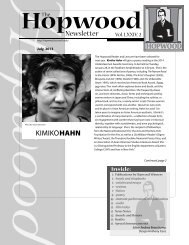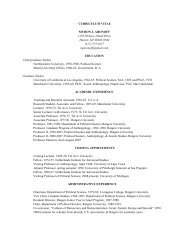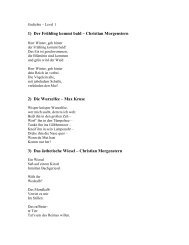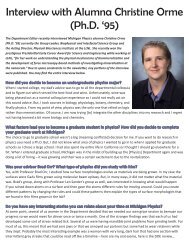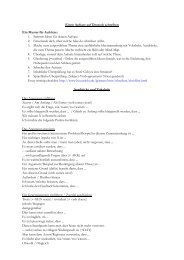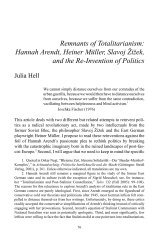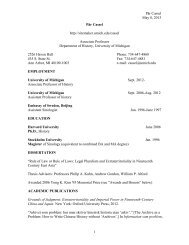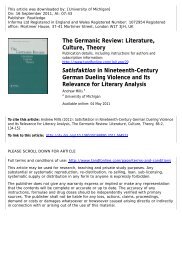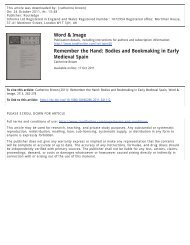Making History Personal: Constantine Cavafy and the Rise of Rome
Making History Personal: Constantine Cavafy and the Rise of Rome
Making History Personal: Constantine Cavafy and the Rise of Rome
You also want an ePaper? Increase the reach of your titles
YUMPU automatically turns print PDFs into web optimized ePapers that Google loves.
Frier, “<strong>Making</strong> <strong>History</strong> <strong>Personal</strong>,” page 25<br />
tertainment.” 81 This music is heard, not by Alex<strong>and</strong>rians, but by Antony himself. The poem<br />
proceeds ra<strong>the</strong>r as though Antony’s Super-Ego were admonishing him to take courage in <strong>the</strong> face<br />
<strong>of</strong> adversity, to “go without faltering toward <strong>the</strong> window” <strong>and</strong> drink in <strong>the</strong> “exquisite instru-<br />
ments” <strong>of</strong> <strong>the</strong> passing throng; but <strong>the</strong> poem is phrased so broadly that, were it not for its title, <strong>the</strong><br />
same exhortation might have been directed toward any Alex<strong>and</strong>rian confronting <strong>the</strong> reality that<br />
he must eventually, at least through death, lose <strong>the</strong> beloved hurly-burly <strong>of</strong> <strong>the</strong> city. 82 In <strong>Cavafy</strong>’s<br />
narrative, <strong>the</strong>re is, in fact, no longer any distinct omen to be construed. 83 Ra<strong>the</strong>r, <strong>the</strong> “invisible<br />
company” that passes below Antony’s window is, in a way, Alex<strong>and</strong>ria itself, an “Alex<strong>and</strong>ria,<br />
who is leaving,” or alternatively an “Alex<strong>and</strong>ria, whom [he is] losing,” even as his life ends.<br />
Both city <strong>and</strong> man are thus agents in this process <strong>of</strong> mutual separation: <strong>the</strong> city proceeds ineluct-<br />
ably onward, away from him, while from his window Antony bids it “farewell.” 84 <strong>Cavafy</strong>’s<br />
presentation leaves it indeterminate whe<strong>the</strong>r <strong>the</strong> “God” <strong>of</strong> his title, who ab<strong>and</strong>ons Antony, is in-<br />
tended (as some have thought) to be <strong>the</strong> eponymous deity <strong>of</strong> Alex<strong>and</strong>ria, substituted for Plu-<br />
tarch’s Dionysos. 85<br />
Perhaps, instead, Antony’s acceptance <strong>of</strong> his fate is, within a larger frame-<br />
work, only an epiphenomenon <strong>of</strong> <strong>the</strong> withdrawal <strong>of</strong> divine favor. In any case, <strong>the</strong> broader mes-<br />
81<br />
Compare Mendelsohn, Collected Poems (2009) 376: “Of special interest here is <strong>the</strong> emphasis on <strong>the</strong> faculty<br />
<strong>of</strong> hearing as <strong>the</strong> vehicle for apprehending <strong>the</strong> true significance <strong>of</strong> what is taking place, a connection that strongly<br />
links this poem to ‘But Wise Men Apprehend What is Imminent,’ <strong>the</strong> first in this series <strong>of</strong> four poems about <strong>the</strong> wise<br />
man’s preparedness—or lack <strong>the</strong>re<strong>of</strong>—for <strong>the</strong> uncertainties <strong>of</strong> life.” See my conclusion below.<br />
82<br />
This Super-Ego device recurs in several <strong>of</strong> <strong>Cavafy</strong>’s poems from this period, most notably “Ithaca” (written<br />
a month earlier in 1911); see Keeley, <strong>Cavafy</strong>’s Alex<strong>and</strong>ria 37, 40-41; Anton, Poetry <strong>and</strong> Poetics (1995) 300-338.<br />
Haag, Alex<strong>and</strong>ria (2004) 68-69, also compares “The City” (1894, published in 1910), with much <strong>the</strong> same message.<br />
Of some interest here are two poems drawn from Roman politics: “Ides <strong>of</strong> March” (1911) <strong>and</strong> “Theodotus” (1915).<br />
Both concern <strong>the</strong> vicissitudes <strong>of</strong> <strong>the</strong> late Republican civil strife <strong>and</strong> counsel against over-confidence or hubris; <strong>and</strong>,<br />
oddly, both feature Greeks interacting with Roman politicians: Theodotus, a minister <strong>of</strong> Ptolemy XIII Philopator,<br />
who betrayed <strong>and</strong> beheaded Pompey following his defeat at Pharsalus in 49; <strong>and</strong> Artemidorus, who unsuccessfully<br />
attempted to alert Julius Caesar about <strong>the</strong> conspiracy in 44. Both make use <strong>of</strong> <strong>the</strong> Super-Ego perspective.<br />
83<br />
As I read <strong>the</strong> poem, Antony actually anticipates <strong>the</strong> music; in <strong>the</strong> poem’s first half, <strong>the</strong> music is only imminent<br />
(“When … <strong>the</strong>re comes <strong>the</strong> sound”), but Antony <strong>the</strong>n hears it in fact as he moves toward <strong>the</strong> window. This<br />
accords with <strong>the</strong> program in “But Wise Men Apprehend What Is Imminent” (1896), discussed below. I’m grateful<br />
to Ruth Scodel for discussing this interpretation with me.<br />
84<br />
The exhortation to avoid “<strong>the</strong> entreaties <strong>and</strong> <strong>the</strong> whining <strong>of</strong> a coward” contrasts sharply with Antony’s selfpitying<br />
complaints in Plutarch’s life (e.g., Antony 75.1-2, 76.3-77.3)—an observation made by Anton, Poetry <strong>and</strong><br />
Poetics (1995) 329. But, as Anton also notes (318), reality is <strong>of</strong> slight consequence here. Keeley, Alex<strong>and</strong>ria<br />
(1976) 41, captures <strong>the</strong> poem’s deeper point: “[W]hat … defines this kind <strong>of</strong> city <strong>and</strong> those worthy <strong>of</strong> knowing it is<br />
<strong>the</strong> ability to see things for what <strong>the</strong>y are, honestly <strong>and</strong> courageously, even when what one sees is <strong>the</strong> inevitable loss<br />
<strong>of</strong> all else that <strong>the</strong> city has come to represent[,] … to face <strong>the</strong> reality beyond <strong>the</strong> window without self-deception <strong>and</strong><br />
without hope, but with <strong>the</strong> courage to feel deeply <strong>the</strong> last exquisite manifestation <strong>of</strong> <strong>the</strong> divine life you are losing.”<br />
85<br />
Keeley, Alex<strong>and</strong>ria (1976) 6, believes, not implausibly, that Alex<strong>and</strong>ria replaced Dionysos. However, <strong>Cavafy</strong><br />
himself later stated that his poem was set at <strong>the</strong> moment “during which <strong>the</strong> god Dionysos forsakes him (invisible<br />
troupe)”: <strong>Cavafy</strong>, “Commentary” (2003/2004) 9.



